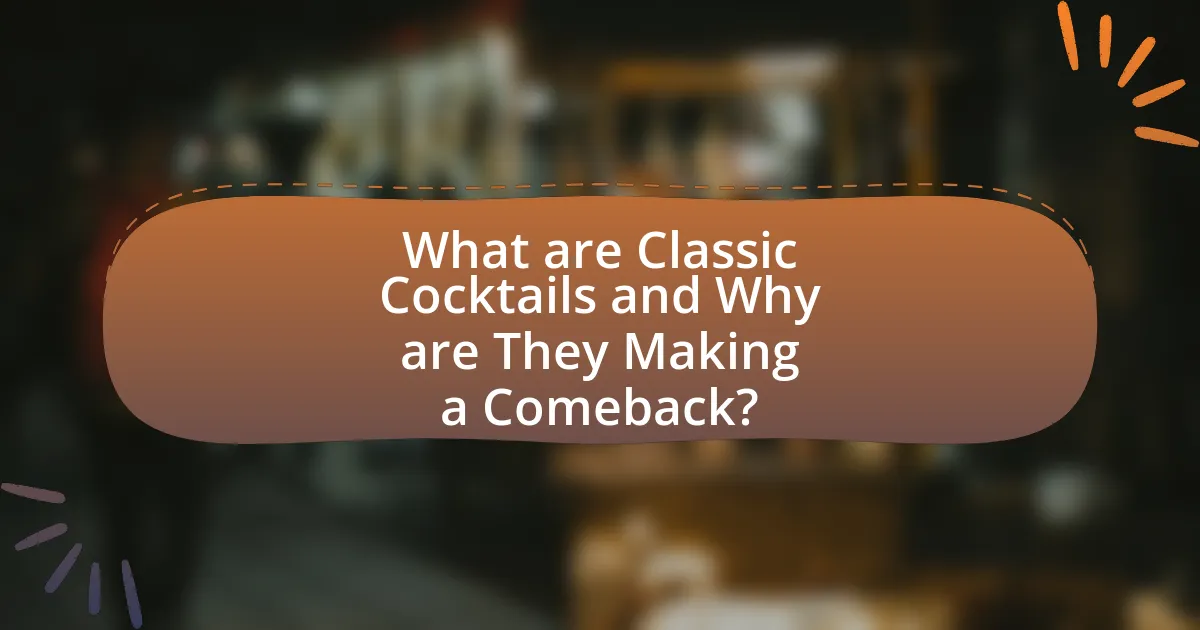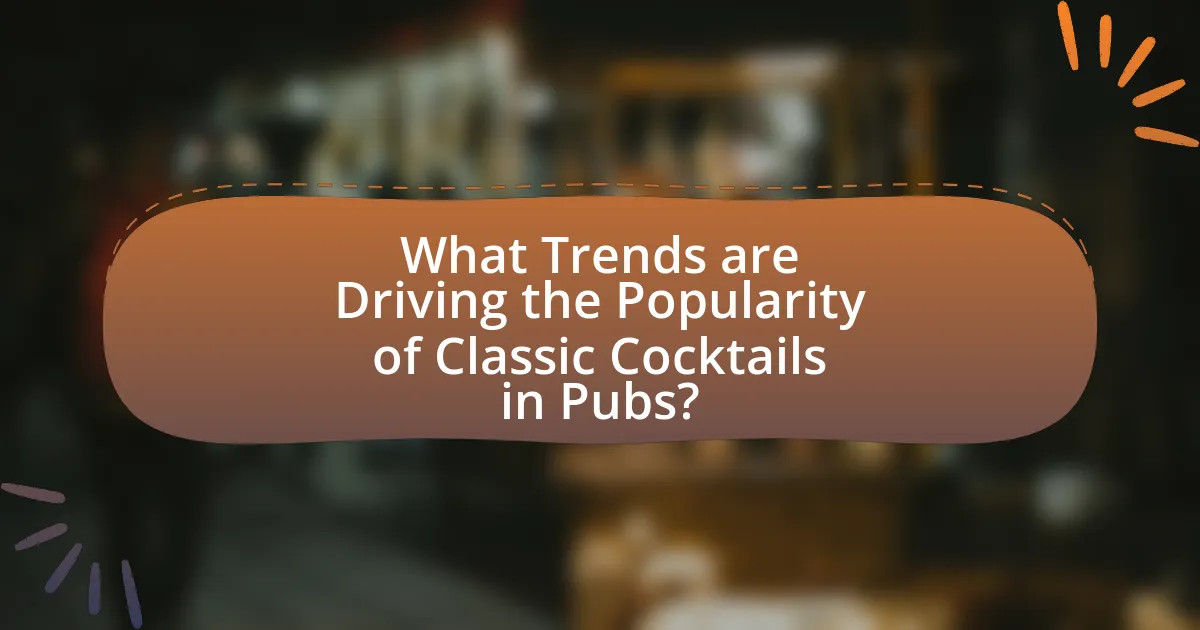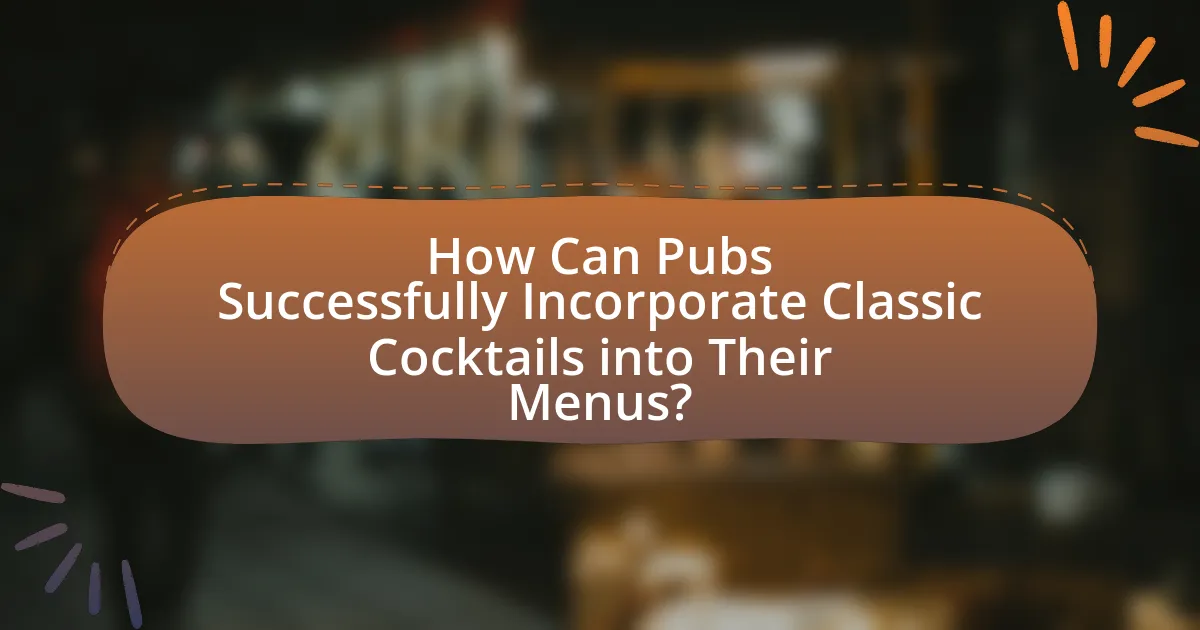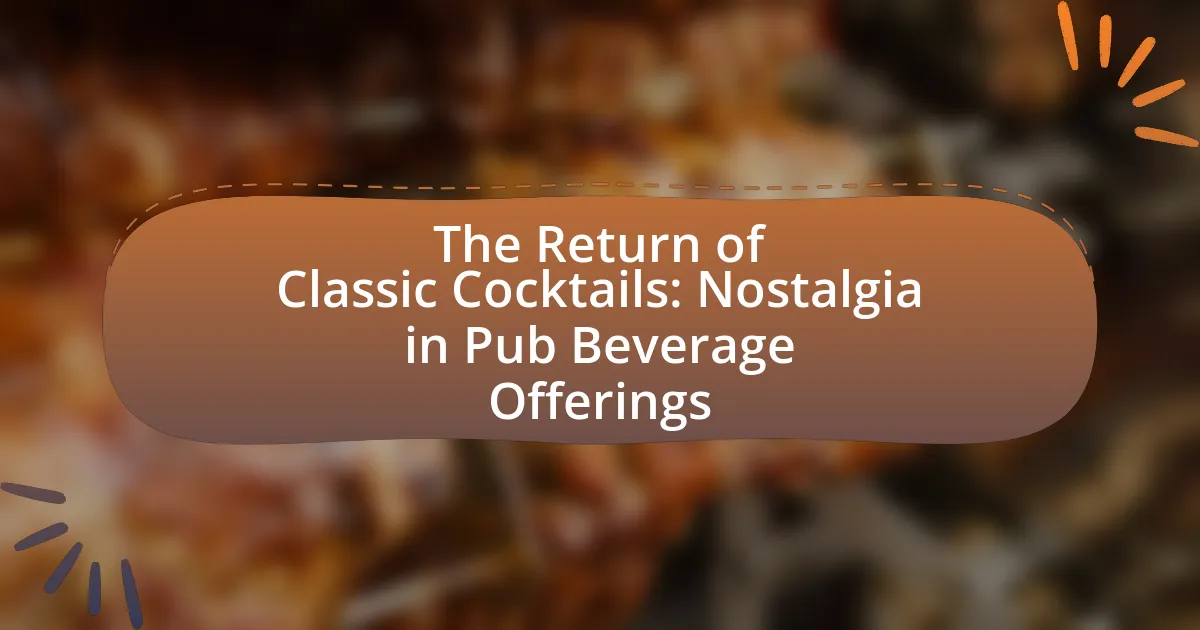The article focuses on the resurgence of classic cocktails in pub beverage offerings, highlighting their historical significance and the factors contributing to their renewed popularity. It examines the characteristics that differentiate classic cocktails from modern mixology, the essential ingredients that define them, and the evolving presentation styles that enhance their appeal. Additionally, the article explores the role of nostalgia in consumer preferences, the influence of social media, and the impact of craft cocktail bars on this trend. Strategies for pubs to successfully incorporate classic cocktails into their menus, including staff training and effective marketing techniques, are also discussed, providing a comprehensive overview of the current landscape of cocktail culture.

What are Classic Cocktails and Why are They Making a Comeback?
Classic cocktails are traditional mixed drinks that have stood the test of time, often featuring a combination of spirits, bitters, and other ingredients, with iconic examples including the Martini, Old Fashioned, and Manhattan. Their resurgence in popularity can be attributed to a growing interest in craft cocktail culture, where consumers seek authenticity and quality in their drinking experiences, alongside a nostalgic appeal for simpler, classic flavors that evoke a sense of history and craftsmanship. This trend is supported by the rise of speakeasy-style bars and cocktail lounges that emphasize artisanal techniques and premium ingredients, reflecting a broader movement towards appreciating the art of mixology.
How do Classic Cocktails differ from Modern Mixology?
Classic cocktails are characterized by their adherence to traditional recipes and techniques, while modern mixology emphasizes creativity, innovation, and the use of diverse ingredients. Classic cocktails, such as the Martini or Old Fashioned, typically rely on a limited number of high-quality ingredients and established methods, reflecting a historical context that dates back to the early 20th century. In contrast, modern mixology often incorporates experimental flavors, molecular gastronomy, and artisanal spirits, showcasing a broader range of influences and trends in contemporary drinking culture. This distinction highlights the evolution of cocktail culture, where classic cocktails evoke nostalgia and authenticity, while modern mixology represents a dynamic and evolving approach to beverage creation.
What ingredients define Classic Cocktails?
Classic cocktails are defined by a combination of foundational ingredients such as spirits, bitters, sweeteners, and modifiers. These ingredients create a balanced flavor profile that is characteristic of classic recipes. For example, a Martini typically includes gin and dry vermouth, while a Manhattan consists of whiskey, sweet vermouth, and bitters. The use of these specific ingredients has historical significance, as many classic cocktails date back to the late 19th and early 20th centuries, reflecting the drinking culture of that era.
How has the presentation of Classic Cocktails evolved?
The presentation of Classic Cocktails has evolved significantly from simple, straightforward servings to more elaborate and visually appealing presentations. Historically, classic cocktails were often served in standard glassware with minimal garnishing, focusing primarily on taste. In recent years, bartenders have embraced creativity, incorporating unique glassware, intricate garnishes, and artistic techniques such as layering and smoking to enhance the visual appeal and overall experience. This shift reflects a broader trend in the beverage industry towards experiential drinking, where aesthetics play a crucial role in attracting consumers and enhancing nostalgia for traditional recipes.
Why is Nostalgia a Key Factor in the Return of Classic Cocktails?
Nostalgia is a key factor in the return of classic cocktails because it evokes positive memories and emotional connections to the past. This emotional resonance drives consumers to seek familiar flavors and experiences, often associated with social gatherings and celebrations from earlier decades. Research indicates that nostalgia can enhance mood and increase consumer spending, as seen in the resurgence of vintage cocktail recipes from the 1920s to the 1980s, which are now prominently featured in bars and restaurants. The trend reflects a broader cultural movement where individuals yearn for simpler times, making classic cocktails not just beverages but also vessels of cherished memories.
How does nostalgia influence consumer preferences in pubs?
Nostalgia significantly influences consumer preferences in pubs by evoking positive memories associated with past experiences, leading to increased patronage and selection of classic cocktails. Research indicates that nostalgic feelings can enhance emotional connections to specific beverages, prompting consumers to choose drinks that remind them of enjoyable moments, such as family gatherings or celebrations. For instance, a study published in the Journal of Consumer Research found that nostalgia can increase consumers’ willingness to pay for products that evoke these memories, demonstrating its impact on purchasing behavior. This emotional resonance drives pubs to incorporate classic cocktails into their offerings, appealing to consumers’ desire for familiarity and comfort.
What role does social media play in reviving interest in Classic Cocktails?
Social media plays a crucial role in reviving interest in classic cocktails by providing a platform for sharing recipes, visuals, and trends that engage a wide audience. Platforms like Instagram and TikTok allow bartenders and enthusiasts to showcase their creations, often using visually appealing content that captures the essence of these timeless drinks. This visual storytelling not only educates consumers about classic cocktails but also fosters a sense of community among cocktail lovers. Additionally, hashtags related to classic cocktails, such as #ClassicCocktails or #CocktailCulture, facilitate the discovery of content and trends, further driving interest. According to a study by the Beverage Information Group, social media significantly influences consumer choices, with 30% of respondents indicating that social media posts inspire their drink selections.

What Trends are Driving the Popularity of Classic Cocktails in Pubs?
The popularity of classic cocktails in pubs is driven by trends such as nostalgia, craft cocktail culture, and a focus on quality ingredients. Nostalgia plays a significant role as consumers seek familiar flavors and experiences reminiscent of past eras, particularly the mid-20th century when classic cocktails were at their peak. The craft cocktail movement emphasizes artisanal preparation and high-quality ingredients, encouraging bartenders to revive traditional recipes with a modern twist. Additionally, the rise of social media has amplified interest in visually appealing drinks, prompting pubs to feature classic cocktails that are both photogenic and flavorful. These trends collectively contribute to the resurgence of classic cocktails in the pub scene.
How are Craft Cocktail Bars influencing the resurgence of Classic Cocktails?
Craft cocktail bars are significantly influencing the resurgence of classic cocktails by emphasizing quality ingredients, artisanal techniques, and a focus on historical recipes. These establishments often revive traditional cocktails, such as the Old Fashioned and Negroni, by using fresh, locally sourced ingredients and house-made syrups, which enhances the overall flavor profile and authenticity. According to a 2021 report by the Distilled Spirits Council, the craft cocktail movement has led to a 20% increase in the sales of classic cocktails over the past five years, demonstrating a clear consumer preference for these nostalgic drinks. This trend is further supported by bartenders who are increasingly trained in classic mixology, ensuring that the preparation methods and presentation align with historical standards, thus fostering a deeper appreciation for the heritage of cocktail culture.
What unique twists are bars adding to Classic Cocktails?
Bars are adding unique twists to classic cocktails by incorporating unconventional ingredients and modern techniques. For example, mixologists are using flavored bitters, house-made syrups, and artisanal spirits to enhance traditional recipes. Additionally, some bars are experimenting with molecular gastronomy, such as creating foams or gels that add new textures and flavors to drinks like the Old Fashioned or Martini. This trend reflects a broader movement towards innovation in cocktail culture, where nostalgia meets creativity, appealing to both classic cocktail enthusiasts and adventurous drinkers.
How do seasonal ingredients impact the offerings of Classic Cocktails?
Seasonal ingredients significantly enhance the offerings of classic cocktails by introducing fresh flavors and promoting local sourcing. For instance, using seasonal fruits like strawberries in summer or cranberries in winter allows bartenders to create vibrant, flavorful variations of traditional recipes, such as the Daiquiri or the Cosmopolitan. This practice not only elevates the taste profile but also aligns with consumer preferences for sustainability and freshness, as evidenced by a 2021 survey indicating that 70% of consumers prefer cocktails made with local ingredients. Consequently, the integration of seasonal ingredients revitalizes classic cocktails, making them more appealing and relevant to contemporary drinkers.
What demographic is most drawn to Classic Cocktails?
The demographic most drawn to classic cocktails is typically adults aged 25 to 40, particularly those with a higher disposable income and an interest in culinary experiences. This age group often seeks out nostalgic and artisanal drinking experiences, reflecting a broader trend towards vintage and craft beverages. Research indicates that millennials and younger Gen Xers are increasingly favoring classic cocktails, as evidenced by a 2021 survey from the Distilled Spirits Council, which found that 60% of respondents in this age range prefer cocktails with historical significance or traditional recipes.
How do age and lifestyle affect preferences for Classic Cocktails?
Age and lifestyle significantly influence preferences for Classic Cocktails, with older individuals often favoring traditional recipes due to nostalgia and familiarity. Research indicates that consumers aged 35 and above are more likely to appreciate the craftsmanship and history behind Classic Cocktails, such as the Old Fashioned or Martini, as these drinks evoke memories of past social experiences. In contrast, younger drinkers, particularly those in their 20s, may lean towards modern interpretations or innovative cocktails, reflecting a lifestyle that values novelty and experimentation. Additionally, lifestyle factors such as social settings and health consciousness can further shape these preferences; for instance, individuals who prioritize socializing in upscale environments may gravitate towards Classic Cocktails as a symbol of sophistication.
What are the drinking habits of consumers favoring Classic Cocktails?
Consumers favoring Classic Cocktails typically exhibit a preference for traditional recipes and high-quality ingredients, often seeking out establishments that emphasize craftsmanship and authenticity. These consumers tend to enjoy drinks like the Old Fashioned, Martini, and Negroni, which reflect a nostalgic appreciation for classic mixology. Research indicates that 60% of cocktail drinkers express a preference for classic cocktails over modern variations, highlighting a trend towards timeless flavors and preparation methods. This inclination is often driven by a desire for a more sophisticated drinking experience, with many consumers valuing the history and cultural significance behind these beverages.

How Can Pubs Successfully Incorporate Classic Cocktails into Their Menus?
Pubs can successfully incorporate classic cocktails into their menus by offering a curated selection that highlights traditional recipes while ensuring quality ingredients and skilled preparation. This approach not only appeals to customers’ nostalgia but also enhances the overall drinking experience. For instance, using fresh, high-quality spirits and house-made mixers can elevate classics like the Old Fashioned or Martini, making them stand out. Additionally, training bartenders in the art of classic cocktail preparation ensures consistency and authenticity, which is crucial for customer satisfaction. According to a 2021 industry report by the Beverage Marketing Corporation, the resurgence of classic cocktails has been linked to a 15% increase in sales for establishments that prioritize cocktail quality and presentation.
What strategies should pubs use to market Classic Cocktails?
Pubs should utilize a combination of storytelling, social media engagement, and themed events to effectively market Classic Cocktails. Storytelling can evoke nostalgia by sharing the history and cultural significance of each cocktail, which resonates with customers seeking authentic experiences. Social media platforms, particularly Instagram and Facebook, can showcase visually appealing images of Classic Cocktails, leveraging hashtags and user-generated content to increase visibility and engagement. Themed events, such as “Classic Cocktail Nights,” can attract patrons by offering special promotions and live demonstrations, creating an immersive experience that highlights the craftsmanship behind these drinks. According to a study by the Beverage Marketing Corporation, the resurgence of interest in classic cocktails has been linked to consumers’ desire for authenticity and quality, making these strategies particularly relevant.
How can storytelling enhance the appeal of Classic Cocktails?
Storytelling enhances the appeal of classic cocktails by creating a deeper emotional connection between the drink and the consumer. This connection is established through narratives that highlight the history, cultural significance, and unique ingredients of each cocktail, making the experience more engaging. For instance, a classic cocktail like the Old Fashioned can be linked to its origins in the 19th century, where it was a symbol of sophistication and social status, thus enriching the drinking experience with a sense of nostalgia and authenticity. By sharing these stories, bartenders can evoke memories and emotions, making the cocktails not just beverages but vessels of shared experiences and traditions.
What role do staff training and knowledge play in promoting Classic Cocktails?
Staff training and knowledge are crucial in promoting Classic Cocktails as they ensure that bartenders can accurately prepare and present these drinks, enhancing customer experience. Well-trained staff possess the skills to craft cocktails with precision, understand the historical context of each drink, and communicate effectively with patrons about ingredients and preparation methods. This expertise not only builds customer trust but also fosters a deeper appreciation for the craftsmanship involved in Classic Cocktails. Research indicates that establishments with knowledgeable staff see increased customer satisfaction and repeat business, as patrons are more likely to return when they receive informed recommendations and high-quality service.
What are some best practices for creating a Classic Cocktail menu?
To create a Classic Cocktail menu effectively, focus on a balanced selection of timeless drinks that highlight quality ingredients and traditional preparation methods. Incorporating well-known classics such as the Martini, Old Fashioned, and Negroni ensures familiarity and appeal to a broad audience. Additionally, providing detailed descriptions of each cocktail, including key ingredients and flavor profiles, enhances customer engagement and informs choices.
Utilizing high-quality spirits and fresh ingredients is essential, as these factors significantly impact the taste and overall experience. Furthermore, maintaining consistency in preparation and presentation across all cocktails reinforces brand reliability and customer satisfaction. Historical context can also be included to enrich the menu, as many classic cocktails have fascinating backstories that resonate with patrons seeking nostalgia.
How can pubs balance Classic Cocktails with contemporary offerings?
Pubs can balance classic cocktails with contemporary offerings by creating a diverse menu that features both traditional recipes and innovative twists. This approach allows establishments to cater to a wide range of customer preferences, appealing to those who appreciate nostalgia while also attracting adventurous drinkers. For instance, a pub might offer a classic Martini alongside a modern variation that incorporates unique ingredients like flavored bitters or artisanal spirits. This strategy not only honors the heritage of classic cocktails but also embraces current trends in mixology, ensuring that the menu remains relevant and engaging.
What are the common pitfalls to avoid when introducing Classic Cocktails?
Common pitfalls to avoid when introducing Classic Cocktails include neglecting proper ingredient quality, failing to train staff adequately, and overlooking the importance of presentation. Using low-quality ingredients can compromise the flavor and authenticity of cocktails, as classic recipes often rely on specific spirits and fresh components. Inadequate staff training can lead to inconsistent preparation and poor customer experiences, as bartenders may not understand the nuances of classic techniques. Lastly, neglecting presentation can diminish the overall appeal, as classic cocktails are often visually striking and part of their allure.
What tips can pubs follow to ensure the quality of Classic Cocktails?
Pubs can ensure the quality of Classic Cocktails by using fresh, high-quality ingredients and adhering to traditional recipes. Fresh ingredients, such as fruits and herbs, enhance flavor and aroma, while traditional recipes maintain authenticity and consistency. For example, using freshly squeezed citrus juice instead of bottled juice can significantly improve the taste of cocktails like Margaritas and Daiquiris. Additionally, proper training for bartenders on techniques such as shaking, stirring, and garnishing is essential to achieve the desired texture and presentation. This focus on quality ingredients and skilled preparation aligns with the resurgence of interest in Classic Cocktails, as consumers increasingly seek authentic and nostalgic drinking experiences.
